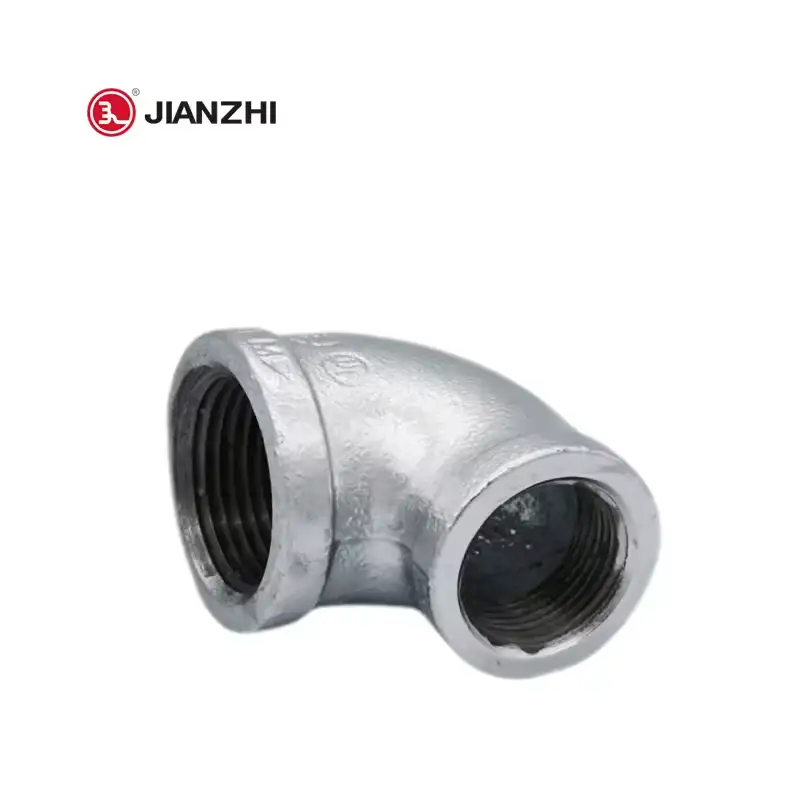In the world of plumbing, picking the right materials for fittings is key to making sure your system is durable, reliable, and efficient. Both GI fittings and PVC fittings are commonly used, but each has its own set of benefits. That said, when it comes to strength, long-lasting performance, and handling tough conditions, GI pipe fittings really stand out, especially for more challenging plumbing jobs.
What Are GI Fittings and PVC Fittings?
- GI Fittings: GI fittings are plumbing components made from galvanized iron (GI), a material that undergoes a galvanization process where a layer of zinc is applied to iron to prevent rust and corrosion. These fittings are typically crafted from malleable iron, which allows them to be easily shaped and designed for a variety of plumbing connections. The result is a strong, durable fitting that can withstand extreme conditions.
- PVC Fittings: PVC fittings are made from polyvinyl chloride, a lightweight, plastic material commonly used in plumbing systems for water and drainage applications. These fittings are easy to install, resistant to corrosion, and generally more affordable than metal fittings.
Advantages of GI Fittings Over PVC Fittings
- Enhanced Durability and Strength
One of the primary advantages of GI fittings is their strength. Made from malleable iron, GI fittings are able to withstand high levels of stress and pressure. They are particularly advantageous in industrial, commercial, and outdoor environments where plumbing systems are exposed to heavy loads, physical impacts, and high-pressure conditions. Unlike PVC fittings, which can crack or degrade under stress, GI fittings provide a more reliable and long-lasting solution. - Superior Resistance to Corrosion in Harsh Environments
The galvanization process that GI fittings undergo gives them excellent resistance to corrosion, making them ideal for systems exposed to moisture, humidity, or chemicals. This makes them especially suited for plumbing applications in industrial, marine, and coastal areas, where corrosion from saltwater or harsh chemicals is a common problem. While PVC fittings resist corrosion from most water and chemicals, they may not perform as well in extreme environmental conditions, making GI fittings a more dependable option in certain settings. - Better Performance Under High Temperatures and Pressure
GI fittings are better equipped to handle high-temperature and high-pressure environments compared to PVC fittings. This makes them a preferred choice for hot water systems, steam lines, and gas pipelines. In contrast, PVC fittings can become brittle and prone to failure when exposed to high temperatures, making them less suitable for these demanding applications. - Fire Resistance
Another significant advantage of GI fittings is their fire resistance. Being made of metal, GI fittings do not burn or emit toxic gases when exposed to heat or fire. This makes them a safer option in buildings, industrial plants, and areas where fire safety is a concern. PVC fittings, on the other hand, are flammable and can release harmful chemicals in the event of a fire.

Which Material Is More Cost-Effective: GI Fittings or PVC Fittings?
In terms of initial cost, PVC fittings are typically more affordable than galvanized iron pipe fittings. The lightweight nature of PVC and the simplicity of its manufacturing process contribute to lower production costs, making it a budget-friendly option for residential plumbing systems and non-industrial applications. However, while PVC fittings may seem more economical upfront, their lower durability and the potential for damage in extreme conditions could lead to higher maintenance and replacement costs over time. GI fittings, although more expensive initially, offer superior longevity and performance in demanding environments, often resulting in better long-term value.
Applications of GI and PVC Fittings
- GI Fittings:
GI fittings are widely used in applications that demand strength, durability, and resistance to harsh environmental factors. These include:- 1.Industrial and Commercial Plumbing: Where high pressure, temperature, and corrosive substances are common.
- 2.Gas Pipelines: GI fittings are often used for natural gas and oil pipelines due to their strength and fire resistance.
- 3.Marine and Coastal Applications: Where exposure to saltwater and moisture accelerates corrosion.
- 4.Heavy-Duty Construction: Plumbing systems in factories, power plants, and large buildings often rely on GI fittings for secure connections.
- PVC Fittings:
PVC fittings are typically used in residential and light commercial plumbing systems, particularly for:- 1.Water Supply: Cold water systems where corrosion is not a significant concern.
- 2.Drainage and Waste Systems: PVC is ideal for drainage pipes and venting systems due to its resistance to chemicals.
- 3.Irrigation Systems: Lightweight and easy to install, PVC is a go-to choice for agricultural and landscaping applications.
Why Choose GI Fittings?
While PVC fittings offer an affordable, lightweight option for many plumbing needs, GI fittings—especially those made from malleable iron—outperform PVC in critical areas such as durability, strength, and resistance to environmental stresses. For applications requiring high strength, corrosion resistance, and performance in extreme conditions, GI fittings are the superior choice.
At Jianzhi, as a leading GI pipe fitting supplier, we provide high-quality GI fittings designed for long-lasting performance and reliability. Our malleable iron fittings are ideal for industrial, commercial, and residential plumbing systems where secure and robust connections are essential.
For more information or to inquire about our GI pipe fittings, please contact us today.
